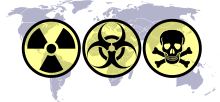| UN Security Council Resolution 1540 | ||
|---|---|---|
 | ||
| Date | 28 April 2004 | |
| Meeting no. | 4,956 | |
| Code | S/RES/1540 (Document) | |
| Subject | Non-proliferation of weapons of mass destruction | |
Voting summary |
| |
| Result | Adopted | |
| Security Council composition | ||
Permanent members | ||
Non-permanent members | ||
| ||
United Nations Security Council resolution 1540 was adopted unanimously on 28 April 2004 regarding the non-proliferation of weapons of mass destruction.[1] The resolution establishes the obligations under Chapter VII of the United Nations Charter for all member states to develop and enforce appropriate legal and regulatory measures against the proliferation of chemical, biological, radiological, and nuclear weapons and their means of delivery, in particular, to prevent the spread of weapons of mass destruction to non-state actors.
It is notable in that it recognizes non-state proliferation as a threat to the peace under the terms of Chapter VII of the United Nations Charter, and creates an obligation for states to modify their internal legislation.
Furthermore, the resolution requires every state to criminalize various forms of non-state actor involvement in weapons of mass destruction and its related activities in its domestic legislation and, once in place, to enforce such legislation. By virtue of its universal scope and mandatory nature, resolution 1540 marks a departure from previous nonproliferation arrangements and adds a novel layer to the nonproliferation regime. Before the resolution was adopted, the non-proliferation regime was based on many partly overlapping arrangements, none of which established universal mandatory obligations.[2]
- ^ "1540 Committee". United Nations. Archived from the original on 20 February 2020. Retrieved 11 February 2021.
- ^ Heupel, Monika (2007). "Implementing UN Security Council Resolution 1540: A division of labour strategy" (PDF). Carnegie Endowment for International Peace. 87. Archived (PDF) from the original on 17 December 2020. Retrieved 26 May 2010.
